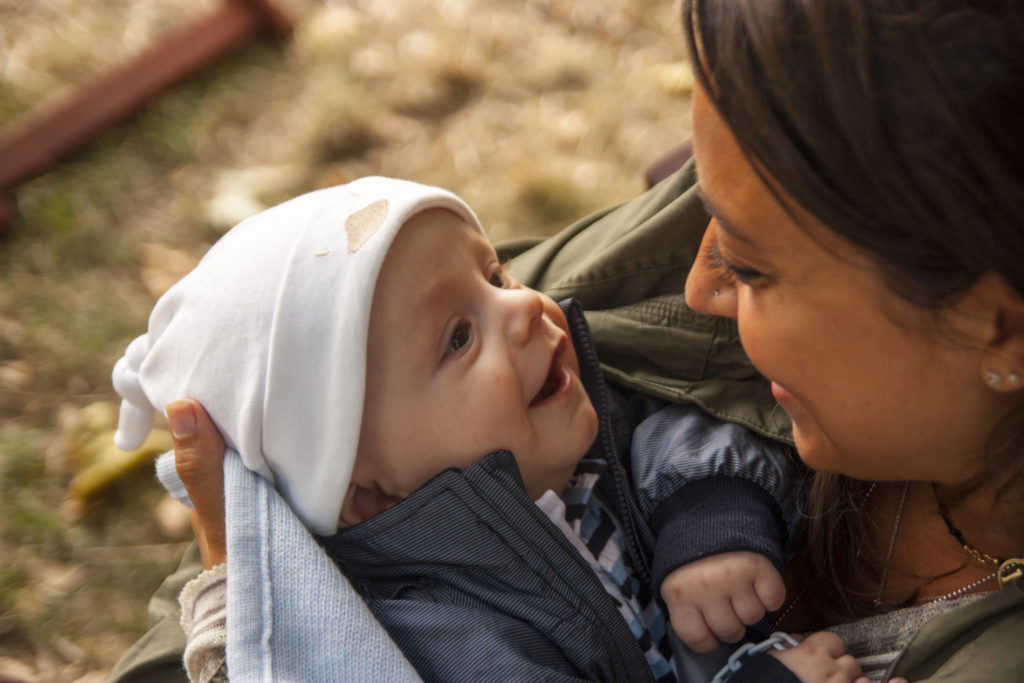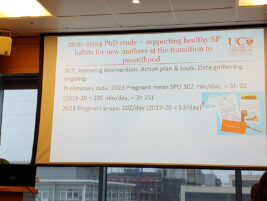A group of individuals from the USA and France have been dedicated to sharing the knowledge, wisdom, and research of the late Dr. Emmi Pikler, Hungarian pediatrician and researcher. In 2003, they established a nonprofit entity under the name of Pikler/Loczy Fund USA (PLUSA).[1] This article is about the steps they are taking related to their goal. There are Pikler-inspired residential nursery homes in Hungary as well as in other countries. In Pifo, Ecuador; Etienne Moine and his wife Maria del Carmen Vasquez have built a beautiful children’s home. It is called Nuestro Hogar (“Our Home”). Delfena Mitchell directs Liberty, an impressive residential program for children in Belize which was built and supported by Marcelle Delahaye who is from the UK. Also, the Founder of Whole Child International, Karen Gordon, is using the Pikler approach in orphanages she has been working with in Nicaragua and El Salvador. All of these individuals have been to the Pikler Institute and trained with the professionals there.
Who was Pikler?
Dr. Emmi Pikler went to medical school in Vienna in the 1920’s. Dr. Pikler was influenced by her professors Clemens Von Pirquet and Hans Salzer. With their views on physiology and prevention she used their teachings and developed into a very successful family pediatrician during the 1930’s in Budapest. Her first book for parents was designed to help parents understand their children’s needs and their role in meeting those needs. That book, written first in Hungarian is called “Mit tud mar a baba” (What Can the Baby Already Do?” The German translation is called Friedliche Babys – Zufriedene Mütter (Peaceful Babies-Contented Mothers). Pikler taught about respecting babies and allowing them freedom of movement to explore their environment. She also warned not to force a child’s development but to respect their individual rhythms. The parents learned how successful their children were with their own sense of security and self esteem. This gave parents peace of mind to see how well their children did in school and later in life. Those children, called “Pikler Children,” have long since grown up. Pikler was so successful and revered by these families that after World War II in 1946, the Hungarian government asked Dr. Pikler to start a residential nursery home for young children who had lost their family or had been abandoned during the war. She took on this formidable task and under her leadership it became a model program as well as a research and training center visited by people from all around the world. It was first called the National Methodological Institute but in the 1980’s it was renamed The Pikler Institute in honor of Dr. Pikler. It was also informally called “Loczy” after the street where it was located. Dr. Judit Falk, the Director of the Pikler Institute after Dr. Pikler, wrote an article called “Forty Years of Loczy” for the Sensory Awareness Foundation Bulletin which focuses on Emmi Pikler’s life and work. In it, she discusses the underlying principles of the Institute. The success of the Institute was recently validated in the July-December 2010 Issue of the Signal in the articles which were written by Konicheckis, Vamos, Golse, Tardos, and Keren who discussed important elements of the Piklerian pedagogical approach.
What does Pikler’s work have to do with infant mental health?
The answer to that question is everything! Pikler was aware, as was Freud and many others up to the present, of the significance of the infant and toddler period of development and learning. As the motto goes “The first years last forever.” Even the leadership of Head Start, a nation-wide program for low-income children and families in the USA came to see that preschool is too late. A recent expansion of Early Head Start shows that the national program is now focusing extensively on ages 0-3 in addition to preschool.
Pikler’s goal was to create an approach to caring for children in an institutional setting for the first three years, an approach that allowed children to leave the program with a sturdy, clear, healthy, individual identity as a doer and learner. In addition, as anyone who ever observed at the Pikler Institute can attest, each individual child became an active, contributing member of their group. The observer from the USA might see the group was rather larger than is recognized as appropriate in their country; however, considerably smaller than many groups seen in orphanages around the world. This observation is based on the experiences of the authors of this article, both of whom have seen a number of orphanages. Though the group at the Pikler Institute was not a family, the idea was to prepare the children to live in a family as well-adjusted members. To accomplish such a goal required careful selection and extensive training of caregivers as well as intensive ongoing support. Pikler was clear that a special kind of relationship between children and caregivers was a must – a relationship that was close enough to create an ongoing attachment, but not so close that the child would suffer when leaving the institution and the caregiver. The Institute had a primary caregiver system and a continuity of care approach as advocated by J. Ronald Lally and Peter Mangione of WestEd’s Program for Infant Toddler Care at the Child and Family Studies Center in Sausalito, California. An additional note is that Lally and Mangione may well have had that idea reinforced by Magda Gerber. Gerber, a leading infant expert in the United States, was influenced by Pikler, who was a friend, and colleague of hers. Dr. Pikler and Magda Gerber stayed connected even after Gerber left to live and work in the United States.
Pikler was in agreement with Dr. Charles Zeanah (2010) that every child deserves a family; she never asserted that institutional care was as good as a family. But she was clear that as long as there are institutions with infants and toddlers in them, they should be the very best possible. Of course, the controversy of orphanages versus foster homes is alive and well today and is a hot topic among policy setters, funders, and other leaders, as well as infant mental health experts. If Dr. Pikler were alive, she’d be shaking her head at the unfortunate outcomes of foster care in the USA. According to the organization Children Now, “foster youth have an especially high incidence of mental illness. Nationally, the incidences of post-traumatic stress disorder is higher among children who have aged out of foster care (22%) than among American war veterans, (6%) for Afghanistan war veterans and (12-13%) for Iraq war veterans.”
There are several serious problems with most foster care in the USA today. One is attachment, which is a focus of Piklerian theory and practice. It’s clear that a secure attachment is vital to the brain development that goes on in the first three years. Lack of attachment can have serious effects on mental health, later relationships as well as general development, growth, and learning. The problem lies mainly in the foster care systems, where children might be moved from one foster home to another and can have a succession of multiple foster parents and siblings. Another problem with the system is that foster families may lack training and ongoing support. The Journal Zero to Three from the national organization, Zero to Three in the USA, devoted a whole issue to the subject of foster care and the difficulties.
At the Pikler Institute those systemic problems so common in foster care, problems such as attachment, training, and support, were intensely addressed throughout the 65 years of the Institute’s existence. Long-term positive outcomes were a focus for all the years of the Institute. Pikler proved that it is possible to have excellent outcomes for children in institutions. The follow up research has shown that the children who were at the Pikler Institute for their first 3 years became successful, contributing adults in society (Magyar Pszichologiai Szemle, 1972. 29, 3-4, pp. 488-500. Hungary).
The work of the Pikler/Loczy Fund USA
Although members of the PLUSA board have all been to Budapest to study and observe, plus several have consulted with orphanages in various countries since the 1990’s, we want to provide a more recent history. The World Forum On Early Care And Education (World Forum Foundation) conceived by Bonnie and Roger Neugebauer of Exchange Press has put on conferences around the world since 1999. At the 2007 Forum in Kuala Lumpur, Malaysia; a workshop session on orphanages brought together people from a number of countries. Representatives from Tanzania, Ecuador, Indonesia, Israel, France, USA, and Singapore who went to the World Forum went also to a special training in Budapest in 2008 conducted by Anna Tardos, psychologist, Director of the Pikler Institute, and daughter of Emmi Pikler.
Then in 2009 the next World Forum took place in Belfast, Ireland, where a pre-conference meeting brought some of the group together who had originally met in Kuala Lumpur. They formed a working group called “The Rights of Children in Children’s Homes”. As a working group, they agreed to write a book based on their experiences, views, and visions of what children in children’s homes need in order to preserve their mental health by growing, developing, and learning in positive ways through forming a healthy identity, attachment to caregivers, as well as attachment to the group they are in.
Two years later the World Forum met in Honolulu, Hawaii in May, 2011. The Working Group came together once again for a two-day meeting before the conference began. They continued discussing their goals and how to achieve connecting with institutions throughout the world. The book for institutions is now in process under the leadership of Elsa Chahin, a long-time member of both the working group and the Pikler/Loczy Fund USA (PLUSA) group.
One of the members of the working group, Delfena Mitchell, is the Director of a children’s home called Liberty in Belize. Through her efforts, the First Lady of Belize, Kim Simplis Barrow, came to the World Forum and spoke at the opening plenary session. Members of the PLUSA board met with her and the CEO of the Belize Ministry of Human Development and Social Transformation, Judith Alpuche. Through the meeting and discussions, they began organizing a conference in Belize for people who work in institutions in the Caribbean Islands as well as South America. The conference will be conducted in English and Spanish. Plans are underway to have the conference in October, 2012 in Belize.
Why invest in orphanages?
The secret to the success of Pikler lies in the comprehensiveness of the theory, practice, and extensive research which combines to make an effective approach. The other factor relates to the careful attention to attachment over the period of time the child is in the institution. Through the special kind of relationship that Pikler conceived and the practices that assure it, children gain a strong sense of security. Examples of the practices include caregiver interactions plus a system of primary caregivers and continuity of the group and caregivers over the period of their residency. That feeling of security allows the children to explore and experiment (play) on their own and within the group without constant attention or interruptions by adults. One has to see the way children get along with each other and the extent of their play to truly appreciate it. One also has to see the one-on-one caregiver attention each child receives during those essential activities of daily living (sometimes called caregiving routines) such as diapering, dressing, grooming, bathing, and feeding.
Out of home child care in groups was once a controversial subject years ago in the USA when great numbers of mothers who had not been in the workforce joined it. Harming children was regularly cited from many sides of the controversy. The belief was that children, and most especially infants and toddlers, belonged at home in their families. Since then we have research that gives us guidance on how to create quality child care programs – even for infants and toddlers to avoid harmful effects. Unfortunately, the USA is still not among the nations who are doing an extraordinary job in supporting working families with universally available, high quality out-of-home group care. It’s not that we don’t know how to do it, but we lack the resources and support; however, Pikler’s approach to infant-toddler care (and the research behind it) has been influential to child care in the USA and throughout the world. One such program in the United States is Day Schools in Tulsa, Oklahoma. It is operated by PLUSA’s Founder, Laura Briley. She uses the Pikler approach in her NAEYC accredited schools. Programs that understand and use Pikler practices stand out from the average child care program for infants and toddlers. More current research needs to be done in these programs that are using these approaches. It’s not enough to give testimonies about the effect. One of PLUSA’s missions is to begin the research and we would invite anyone with an interest to contact us.
Orphanages are a fact in the world, just as out-of-home child care became a fact. As long as there are orphanages, the Pikler/Loczy Fund USA is determined to find ways to improve them!
References and Resources
Child Welfare League of America. www.CWFL.org Accessed June 13, 2011
Children Now https://www.childrennow.org/index.php/learn/facts_mental_health/ accessed June 14, 2011.
David, M. & Appell, G. (2001). Loczy, an unusual approach to mothering. Budapest: Pikler Loczy Társaság.
Falk, J. (1994). “Forty Years of Loczy” Sensory Awareness Foundation Bulletin, No. 14, Mill Valley, California: Sensory Awareness Foundation. 38-46.
Falk, J. & Pikler, E. (1972). Adatok az Intézetünkben nevelt gyerekek társadalmi beilleszkedéséről (published in) Magyar Pszichológiai Szemle, 29, 3-4, 488-500. Hungary. This was first published in Hungarian in Magyar Pszichológiai Szemle and it is also available in an English translation, which is available at Pikler-Lóczy Association in Budapest. The title in English is The social adjustment of children reared in our Institute.
Gerber, M. see www.rie.org
Golse, B. (2010). Observation, Application and Research: The Pikler Paradigm, The Signal, July-December, 15.
Gonzalez-Mena, J. (2004). What can an orphanage teach us? Lessons from Budapest. Young Children, 59(5), 26-29.
Gonzalez-Mena, J. Chahin, E., & Briley, L. (2005). The Pikler Institute: A unique approach to caring for children. Exchange, November, 49-51
Keren, M. (2010). Can an institution really be a growth promoting environment? The Signal, July-December, 25.
Konicheckis, A. (2010). Being In Movement. The Signal, July-December, 5-6.
Lally, J. R. & Mangione, P. see www.PITC.org
Pikler, E. (1971). Learning of motor skills on the basis of self-induced movements. In Exceptional Infant, vol 2., ed. J. Hellmuth, J., 54-89. New York: Bruner/Mazel.
Pikler, E. (1973). Some contributions to the study of gross motor development of children. In Child and Adolescent Development, ed. A. Sandovsky, 52-64. New York: Free Press.
Pikler. E. (1940). Mit tud már a baba? Budapest, Cserépfalvi Könyvkiadó.
Pikler, E. (1991). Friedliche Babys – Zufriedene Mütter. Wien, Herder Verlag. (Herder-Bücherei.)
Pikler, E. (1993). Excerpts from Peaceful Babies-Contented Mothers. Sensory Awareness Foundation Bulletin, No. 14, Mill Valley, California: Sensory Awareness Foundation. 5-24.
Pikler, E. (2006). Unfolding of infants’ natural gross motor development, Los Angeles, California: Resources for Infant Educarers (RIE)
Tardos, A. (2011). Being with babies. Exchange, 33 (5), 87-89.
Tardos, A. Ed. (2007). Bringing up and providing care for infants and toddlers in an institution. Budapest: Pikler-Loczy Tarsasag.
Tardos, A. (2010). Introducing the Piklerian developmental approach: History and principles. The Signal, July-December, 1-5.
Tardos, A.(2010). The researching infant. The Signal, July-December, 9-14.
Vamos, J. (2010). The role of body caring activities in the Piklerian approach of mothering. The Signal, July-December, 7-8
World Forum On Early Care And Education, see www.WorldForumFoundation.org
Zeanah, C. H. (2010). The Pikler Institute and the Pikler-Loczy method. The Signal, July-December, 16-17.
Zero to Three Journal (2011). January, 31(3). The whole journal and all its articles are dedicated to improving the lives of infants and toddlers in foster care.
Websites
Pikler/Loczy Fund USA, 2437 South Sheridan,Tulsa, Oklahoma 74129 USA. www.Pikler.org
Pikler-Loczy Association for Young Children, 1022. Budapest, Loczy L. u. 3. Hungary. www.pikler.h
International Pikler Association, www.aipl.org
Liberty Children’s Home, Belize, www.libertychildrenbelize.org
Nuestro Hogar Children’s Home, AMI, Amigos de la Vida, Ecuador , www.fundacionami.org.ec
University of Pittsburgh, Office of Child Development , Christina J. Groark and Robert B. McCall. www.dil.sched.pitt.edu/ocd/
Whole Child International, 11726 San Vicente Blvd., Suite 222, Los Angeles, CA 90049. www.wholechild.org
Zero to Three, is a national resource center in the USA designed to support healthy development and well-being of infants, toddlers and their families. www.zerotothree.org
[1] PLUSA was not the first or only Pikler Association. The first was the Association Pikler-Loczy de France. There are associations in Argentina, Austria, Italy, Hungary, Netherlands, Spain, Switzerland, and Germany as of this writing.
Improving infant mental health in orphanages: A goal worth considering
Authors
Gonzalez-Mena, Janet,
Briley, Laura,
United States








